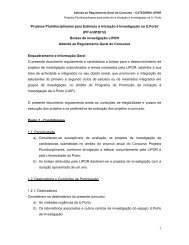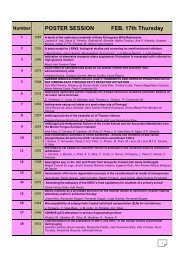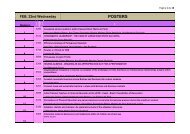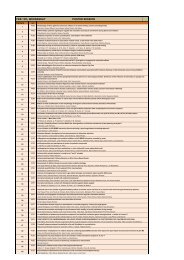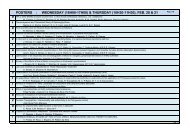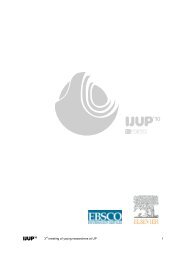IJUP08 - Universidade do Porto
IJUP08 - Universidade do Porto
IJUP08 - Universidade do Porto
- TAGS
- universidade
- porto
- ijup.up.pt
You also want an ePaper? Increase the reach of your titles
YUMPU automatically turns print PDFs into web optimized ePapers that Google loves.
Screening for novel CDH1 inactivating mechanisms in Familial<br />
Gastric Cancer<br />
P. Inácio 1 , H. Pinheiro 1 , J. Carvalho 1 , S. Sousa 1 , R. Seruca 1,2 , C. Oliveira 1,2<br />
1 1.IPATIMUP, <strong>Porto</strong>, Portugal<br />
2 Department of Pathology, Faculty of Medicine, University of <strong>Porto</strong>, Portugal<br />
Gastric cancer exists mainly in its sporadic form but familial aggregation of the disease<br />
occurs in 10% of the cases. Despite all efforts to determine the genetic basis of familial<br />
gastric cancer, a single gene, CDH1, has been identified with a causative role in Hereditary<br />
Diffuse Gastric Cancer (HDGC) and Familial Diffuse Gastric Cancer (FDGC) [1].<br />
Two thirds of HDGC and 90% of FDGC families displaying gastric tumours of the diffuse<br />
histotype remain genetically unexplained.<br />
Since no other candidate gene has been described in these families, but the hereditary<br />
pattern of inheritance and the tumour’s histotype remains the same as the families carrying<br />
CDH1 mutations, our aim is to identify new CDH1 inactivation mechanisms that may<br />
underline the cancer associated familial history observed in these patients.<br />
We screened DNA extracted from peripheral blood lymphocytes (PBLs) from 38 probands<br />
by PCR/Sequencing for two ESTs in CDH1 intron 2 that may represent putative regulatory<br />
regions of the CDH1 expression. Moreover, we analysed PBLs DNA from 62 probands for<br />
germline CDH1 promoter methylation by bisulphite DNA treatment and MS-<br />
PCR/Sequencing, since germline epimutations have been described as disease cause in<br />
other cancer associated syndromes.<br />
We identified a new sequence variant (A>T) at position 27.109 of intron 2, in 22/38<br />
(57.9%) family probands. No other alterations were found at the screened regions.<br />
Hypermethylation of the promoter CpG island 3 of the CDH1 gene was found in PBLs<br />
DNA from two probands of Portuguese families. The screening of normal and tumour<br />
tissue from probands and first degree relatives will confirm the possibility of this being a<br />
heritable germline epimutation.<br />
The confirmation of such results will disclose a new inactivating mechanism of CDH1 in<br />
families displaying gastric cancer.<br />
References:<br />
[1] Guilford P., Hopkins J., Harraway J., McLeod M., Ngahiraka M., Harawira P., Taite H.,<br />
Scoular R., Miller A., Reeve A.E. (1998) E-cadherin germline mutations in familial gastric cancer.<br />
Nature 392, 402-404<br />
206





